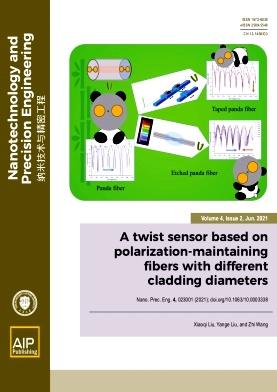An advanced cost-efficient IoT method for stroke rehabilitation using smart gloves
IF 2.7
3区 工程技术
Q2 MATERIALS SCIENCE, MULTIDISCIPLINARY
Nami Jishu yu Jingmi Gongcheng/Nanotechnology and Precision Engineering
Pub Date : 2023-08-23
DOI:10.1063/10.0020290
引用次数: 0
Abstract
Stroke represents a severe, widespread, and widely acknowledged health crisis on both national and international levels. It is one of the most prevalent life-threatening conditions. Despite impressive advances in treating stroke, in addition to a need for effective patient care services, many sufferers still rely solely on physical interventions. The present paper describes and explains the use of a newly designed gadget for stroke survivors who cannot move their fingers. This is a sophisticated mobile device that enables stroke patients to regain their muscle memory and thus their ability to perform repetitive actions by continuing to tighten and stretch their muscles without the intervention of a physiotherapist. Gamification methodology is used to encourage patients to become involved in the process of rehabilitation. The device also has sensors that take information and transmit it to an app through an ESP32 connection. This enables physicians to view glove usage information remotely and keep track of an individual patient’s health. Communication between app and glove is facilitated by a broker in the Amazon Web Service IoT. With the robotic glove presented here, the recovery rate is found to be 90.23% over four weeks’ duration, which represents a significant improvement compared with existing hospital-based rehabilitation techniques.一种使用智能手套进行中风康复的先进成本效益物联网方法
中风在国家和国际层面上代表着一场严重、广泛和公认的健康危机。它是最常见的危及生命的疾病之一。尽管在治疗中风方面取得了令人印象深刻的进展,但除了需要有效的患者护理服务外,许多患者仍然完全依赖身体干预。本文描述并解释了一种新设计的小工具在中风幸存者无法移动手指时的使用。这是一种复杂的移动设备,使中风患者能够在没有理疗师干预的情况下继续收紧和拉伸肌肉,从而恢复肌肉记忆,从而恢复重复动作的能力。游戏化方法用于鼓励患者参与康复过程。该设备还有传感器,可以获取信息并通过ESP32连接将其传输到应用程序。这使医生能够远程查看手套使用信息,并跟踪单个患者的健康状况。亚马逊网络服务物联网中的经纪人为应用程序和手套之间的通信提供了便利。使用这里介绍的机器人手套,发现在四周的时间内恢复率为90.23%,与现有的基于医院的康复技术相比,这是一个显著的改进。
本文章由计算机程序翻译,如有差异,请以英文原文为准。
求助全文
约1分钟内获得全文
求助全文
来源期刊

Nami Jishu yu Jingmi Gongcheng/Nanotechnology and Precision Engineering
Engineering-Industrial and Manufacturing Engineering
CiteScore
6.50
自引率
0.00%
发文量
1379
审稿时长
14 weeks
 求助内容:
求助内容: 应助结果提醒方式:
应助结果提醒方式:


